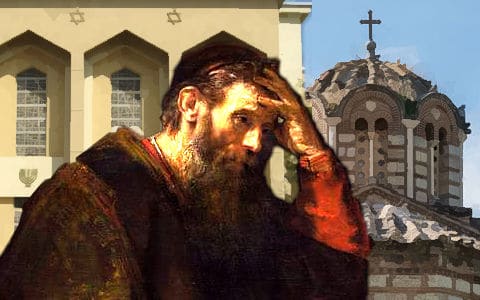Why Paul never used the word synagogue to describe the movement he inspired and chose ecclesia instead—the Greek word we translate as church.
The short answer is that he couldn’t use the word synagogue for a variety of legal and administrative reasons. Ecclesia was a better fit for their role as a para-synagogue organization within the Jewish umbrella.
There is a second option but not so strong as the first one. Paul thought of ecclesia as defining his concept of Messianic Judaism a restorative movement claiming back to the time of Ezra.
History
Pentecostals, Tongues, and Higher Criticism
The relationship between Pentecostals and the historians Philip Schaff, F. W. Farrar and others along with their influence on the modern definition.
How the traditional definition of tongues all but died and was replaced by the Pentecostal practice of Pentecostal glossolalia — an umbrella term for the language of adoration, singing and writing in tongues, and/or a private act of devotion between a person and God.
Before 1906 there were only two definitions of speaking in tongues within the traditional Christian practice:
- Tongues as the spontaneous ability to speak a foreign language not previously learned or known beforehand
- tongues as someone speaking in one voice and everyone hearing in their own language.
In the 1800’s, this definition expanded:
- Firstly, redefined as glossolalia: an ecstatic state that produces speech-like syllables. A social phenomenon, not a miraculous one
- then modern Pentecostal tongues: a spiritualization of the glossolalia doctrine.
The Azusa Street revival began as a traditional Christian tongues doctrine: many people imbued with the Holy Spirit were perceived with the ability to speak a foreign language spontaneously. The Azusa people and those involved in the greater grassroots holiness movement saw this as a sign to evangelize all the nations. This theology was called Missionary Tongues.
As previously noted in Pentecostal Tongues in Crisis, Pentecostal missionaries arrived at their foreign destinations and discovered they did not have this supernatural linguistic ability.
V. P. Simmons on the Church History of Tongues
The early Pentecostal writer V. P. Simmons on the Church history of tongues–an important and early contribution to the Pentecostal doctrine of tongues. V. P. Simmons is an unknown name in the annals of Pentecostal history and even more so in the general historical records. However, the impact of his historical thesis which connects the …
A History of Chapters and Verses in the Hebrew Bible
The complex story on the present chapter and numbering system of the Hebrew Bible.
The present book divisions, chapters, verses and structure of the Bible were standardized in the sixteenth-century. One would think this would apply exclusively to the Christian editions of the Bible, but has been administered retroactively to ancient Hebrew Bibles as well.
Most would assume the Hebrew Bible is so old and carefully guarded that the text has been standardized for almost 2000 years. This is not so when it comes to book names, chapters and numbering. The Hebrew versions popularly available today are considerably different from the Dead Sea Scrolls when it comes to format structure.
A Critical Look at Tongues and Montanism
A deep look at the data and debates about Montanism and speaking in tongues.
The association between Montanism and the christian rite of speaking in tongues is a matter of debate. The argument depends on which way one traces the lineage of speaking in tongues. The first one is through ecclesiastical literature, which chronicles the passing of this rite through the centuries. Its trajectory is the perceived miraculous speaking or hearing in a foreign language. Montanism does not play a role in the ancient church definition. The second and more prevalent way is to trace the lineage back to pagan Greek antecedents. This path leads to speaking in tongues as glossolalia. Montanism is one of the critical steps in this second order. Pentecostals and Charismatics take this second option further and claim Montanism and their alleged speaking in tongues as their historical parallel.
This article is an in-depth investigation to find whether Montanism plays an essential role in the earlier history of the christian doctrine of speaking in tongues. The provision of source texts, analysis, and comments follow the typical structure of the Gift of Tongues Project. Such details may seem boorish for the regular reader, but the lack of source literature and analysis are two of the most significant problems that have plagued the modern christian doctrine of tongues debate.
The Olympiad Calendar and the Birth Year of Christ
Explaining the ancient Greek Olympiad system and its importance to the birth of Christ.
Thomas Aquinas on the Doctrine of Tongues: Intro
An introduction to Thomas Aquinas’ writings which relate to the dogma of tongues
A Chronology of the Herods: More Details
Charting the dates and lives of the Herods in relation to the birth of Christ and making sense of the differences between competing histories.
